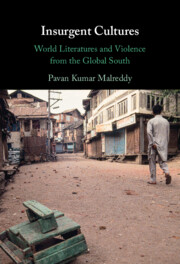‘Pavan Malreddy is a born storyteller. In this, his latest monograph Insurgent Cultures, he spins an intricate web of tales, each of which offers fascinating insights into the 'splintered violence' of contemporary insurgency texts. Insurgency literatures, he argues, have the potential to 'redraw the coordinates of the world from the vantage point of a peripheral imagination'. Highly imaginative in its turn, Malreddy's book moves deftly between insurgency narratives from India, Nigeria, the Middle East and Burma. Taken together, these narratives, covering a variety of genres, go beyond 'the normative discourses of terrorism [and] the nostalgic parlance of revolution' to trace 'the aesthetic and affective trajectories of the insurrectional sublime'. A major contribution to both postcolonial and World Literature studies, Insurgent Cultures offers compelling evidence that these two fields are more closely interrelated than is often imagined to be the case.’
Graham Huggan - Professor of Commonwealth and Postcolonial Literatures at the University of Leeds
‘A thoughtful and thought-provoking study that considers in-depth what is at stake for the insurgent in situations of planned violence around the globe. Insurgent Cultures faces out to readers and scholars of literature and culture from across the Anglophone world. A vital and stimulating read.’
Elleke Boehmer - University of Oxford
‘With all the craft and insight of a fine textile artisan, Pavan Malreddy unpicks and rethreads his way around a series of interwoven post- and counter-colonial tapestries. While the meshes binding insurgency, insurgents and the violence of the world order are convoluted, he is attentive always both to every strand - its filigree, provenance and material constitution - and to their intersectionality, the patterns that emerge from this. In place of essences he finds assemblages, hybridity, complexity. If Benjamin’s angel of history saw debris, Malreddy’s views this debris through hi-res lenses, and detects in it not only ruin but also potential agencies. An exciting, timely study.’
Tom McCarthy - Novelist
‘There is much to praise about this passionately argued and beautifully written book, which reintroduces the insurgency paradigm into the field of postcolonial studies in order to enable a better and more nuanced understanding of contemporary conflicts in the Global South. The book’s theoretical ambition is matched by its carefully researched case studies. In them, the author embarks on a veritable tour de force through fiction and non-fiction texts and films from different geographical regions: Western sub-Saharan Africa, Southeast and South Asia, as well as the Middle East. What I particularly appreciate about Malreddy’s book is that it displays a fine sense for the illuminating power of metaphor, anecdote, and storytelling more generally. Although the book has a strong theoretical focus, each of its chapters gives the primary texts - and their explorations of insurgent figures - the first and last word.’
Michael C. Frank - University of Zurich
‘The breadth of the corpus Insurgent Cultures covers is dizzying, yet Malreddy’s reading is so careful and nuanced that it makes the book a rare achievement. As a novelist the book helped me better understand and articulate the space of my writing and other writers occupy. The book is also an excellent counter-archive to the imperil and state archives of vertical power and their exclusionary mechanisms. The critic is a host, and Malreddy is a quite generous host who curates and creates space for writers from the Middle East to East Asia. Insurgent Cultures is a house of wisdom worthy of many readers as guests.’
Sinan Antoon - New York University


